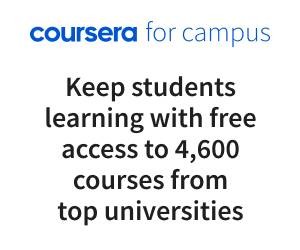Campuses will not be replaced by digital platforms, but prebuilt online programmes can help save faculty time and improve students’ employability
With an estimated 1.12 billion learners affected by the coronavirus, there has been a surge in uptake for online learning courses and curricula. Speaking at the THE Young Universities Summit 2020, Anthony Tattersall, head of EMEA at digital course provider Coursera, discussed the challenges now facing the sector and how young universities – which are often more agile and technologically advanced than older institutions – were already changing in response.
Coursera made its full catalogue available free of charge between March and July, which resulted in a 600 per cent increase in enrolments compared with 2019. Of those new enrolments, “we saw a correlation between countries being put on lockdown and people whose jobs disappeared or were on furlough,” said Tattersall. “[They] were taking this opportunity to invest in themselves.”
Such patterns highlight an awareness of how the workplace is changing and the need for adult students to embrace lifelong learning. A recent report by McKinsey found that about 300 million jobs are at risk of being automated, and the pandemic will accelerate this shift. “Many students want to ensure that when they come out of an educational programme, they have the skills relevant for future work,” he added.
Lockdown has also highlighted the need to build a strong blended learning offering, as many universities are unlikely to be able to fully reopen their campuses in September 2020. “Campuses will not disappear, but they will have to be more flexible in their offerings,” said Tattersall. “We’ll see a lot more universities building and buying online content to support this.”
In addition to educating the traditional undergraduate cohort and adult learners who were either furloughed or made redundant during the coronavirus crisis, lifelong learning needs to be available for those who want to upskill and reskill while they work, said Tattersall. “Individuals are not going to give up their job to continue their learning, so how do you deliver learning to individuals while at work?” he asked. “It needs to be more modular and stackable – projects, courses, professional certificates that can ultimately build into much larger credentials.”
Covenant University, founded in Nigeria in 2002, is one example of a young university that is building for the future in this way. It has the highest rate of graduate employability in Nigeria, at 98 per cent, helped by it placing blended learning at the core of its strategy. There’s a strong business case for other institutions to follow suit, argued Tattersall. “You save faculty time because the teaching component is delivered in a prebuilt online programme, meaning teachers can spend time on other high-value activities such as research.”
Watch the whole session above or on THE’s YouTube channel.
Access all the on-demand recordings and resources from the THE Young Universities Summit 2020.











































































